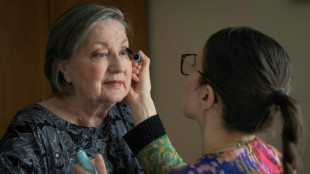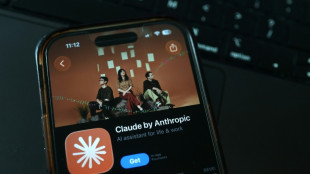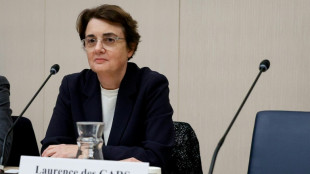
-
 Iran dismisses missile, nuclear claims after Trump alleges 'sinister ambitions'
Iran dismisses missile, nuclear claims after Trump alleges 'sinister ambitions'
-
Inside the Mexican resort that was the final hideout of 'El Mencho'

-
 Somaliland pins hopes on critical mineral gold rush
Somaliland pins hopes on critical mineral gold rush
-
Bejart Ballet's iconic Bolero ignites Istanbul

-
 Sri Lanka arrests ex-spy chief over 2019 Easter bombings
Sri Lanka arrests ex-spy chief over 2019 Easter bombings
-
South Korea birth rate jumps but still under key fertility threshold

-
 Democrats bet on centrism in rebuttal to Trump speech
Democrats bet on centrism in rebuttal to Trump speech
-
Australian police arrest two over alleged kidnapping, murder of grandfather

-
 Redknapp's Gold Cup dream sparked by late grandmother
Redknapp's Gold Cup dream sparked by late grandmother
-
Trump tries to reset presidency in State of the Union speech

-
 Harden hails 'special' Cavs after emphatic win over Knicks
Harden hails 'special' Cavs after emphatic win over Knicks
-
Division, theater and one golden moment as Trump addresses Congress

-
 Humble Japan ready to win hearts at Women's Asian Cup
Humble Japan ready to win hearts at Women's Asian Cup
-
New Zealand mayor swims to allay sewage contamination fears

-
 Trump vows 'turnaround for the ages' in State of the Union
Trump vows 'turnaround for the ages' in State of the Union
-
Marquez targets eighth MotoGP title as season opens in Thailand

-
 Months after floods, Indonesian survivors frustrated by slow response
Months after floods, Indonesian survivors frustrated by slow response
-
Tech firms lead Asian markets rally as Seoul, Tokyo hit records

-
 Nepali migrant workers influence polls, but can't vote
Nepali migrant workers influence polls, but can't vote
-
Canadians are choosing when to die, often with a smile

-
 Trump to promise 'turnaround for the ages' in State of the Union
Trump to promise 'turnaround for the ages' in State of the Union
-
Economy not Russia is big fear on Finland's closed frontier

-
 Alexandria bids farewell to historic tram in latest urban upheaval
Alexandria bids farewell to historic tram in latest urban upheaval
-
The veteran 'insider' shaping Iran's nuclear policy

-
 'Jaws' harpoon gun and 'Star Wars' treasures lead LA film and TV auction
'Jaws' harpoon gun and 'Star Wars' treasures lead LA film and TV auction
-
InterContinental Hotels Group PLC Announces Transaction in Own Shares - February 25

-
 Pentixapharm Receives FDA "Study May Proceed" Letters for Dual Theranostic INDs in CXCR4-Based Hemato-Oncology Program
Pentixapharm Receives FDA "Study May Proceed" Letters for Dual Theranostic INDs in CXCR4-Based Hemato-Oncology Program
-
Tocvan Builds Momentum at Gran Pilar: Six Exploration Holes Drilled, Drone Mag Survey and Water Monitoring Wells for Pilot Completed

-
 Brazil prosecutor urges politicians' conviction in murder of black councilwoman
Brazil prosecutor urges politicians' conviction in murder of black councilwoman
-
Starved of fuel, Cubans scramble to make ends meet

-
 Giant killers Bodo/Glimt continue remarkable rise with Inter triumph
Giant killers Bodo/Glimt continue remarkable rise with Inter triumph
-
Bodo/Glimt knock Inter out of Champions League as Newcastle, Atletico reach last 16

-
 Australian Open chief Tiley steps down to take top US job
Australian Open chief Tiley steps down to take top US job
-
Crime capital no more: El Salvador tourism boosted by Bukele

-
 FIFA boss 'very reassured' about World Cup in Mexico despite violence
FIFA boss 'very reassured' about World Cup in Mexico despite violence
-
15 states sue Trump administration over child vaccine policy

-
 Rescuers search for missing after deluge kills 30 in Brazil
Rescuers search for missing after deluge kills 30 in Brazil
-
Newcastle complete cruise into Champions League last 16

-
 Leverkusen through to Champions League last 16 after Olympiacos draw
Leverkusen through to Champions League last 16 after Olympiacos draw
-
Bodo/Glimt sink Inter to continue Champions League fairy tale

-
 Tech shares rebound as markets weigh AI impacts
Tech shares rebound as markets weigh AI impacts
-
Puerto Vallarta: the Mexican paradise in flames over the killing of 'El Mencho'

-
 Sorloth treble helps Atletico past Brugge into Champions League last 16
Sorloth treble helps Atletico past Brugge into Champions League last 16
-
Louvre president hands in resignation to Macron: Elysee

-
 Iran says deal 'within reach' ahead of US talks
Iran says deal 'within reach' ahead of US talks
-
Torrential rains leave 25 dead in Brazil, dozens missing

-
 Northeast US faces power cuts and school closures after snowstorm
Northeast US faces power cuts and school closures after snowstorm
-
US abstains in UN vote voicing support for Ukraine

-
 Lebanon fears Israeli strikes if Iran situation escalates
Lebanon fears Israeli strikes if Iran situation escalates
-
Trump seeks to strike back in crucial State of the Union


Germans turn to health apps as insurers foot the bill
German doctors are increasingly prescribing smartphone health apps alongside pills and therapy to patients, marking a growing trend towards digital healthcare.
Civil servant Mona Noe, 30, has long kept close watch over her diet in order to reduce cramps and bloating caused by irritable bowel syndrome.
Noe managed to persuade her doctor to prescribe her the app Cara Care, where she receives wellness tips and keeps a food diary to identify her pain triggers.
"It is difficult to do it by yourself," she said, preparing a vegetable stir fry without peppers or tomatoes at her home in Schleiden in western Germany, as per the app's instructions.
"The app has transformed my cooking by helping me avoid certain foods."
Applications that help patients quit smoking, fight obesity or improve their mental health often cost hundreds of euros a month, but insurance companies are helping by footing the bill.
The programme Noe uses is one of 56 now covered by German health insurers, signalling the country's turn towards digital health over traditional pen and paper options.
- 'Around the clock' -
The digital health tools, known as "DiGA" in Germany, have been available on prescription since 2020, typically on three-month renewable subscriptions.
In the five years since the programme began, more than one million prescriptions have been written, according to a study by digital healthcare sector association SVDGV.
Nearly 60 percent of doctors in Germany have prescribed at least one DiGA, and the number of prescriptions written for them in 2024 was up by 85 percent from the previous year.
Johannes Patze, a doctor in Frankfurt, said he prescribes them "almost daily" -- particularly for mental health support while patients are on a waiting list for a therapy appointment.
The apps provide patients with personalised mood tracking, online consultations with professionals, meditation sessions and motivational notifications.
The benefit, Patze said, is that "they're available around the clock, 24/7".
But they come with a cost. A three-month health app subscription costs 600 euros ($705) on average.
Health insurers have paid out 234 million euros for subscription services since 2020.
- 'Easing the burden' -
Germany's Association of Statutory Health Insurance Funds has criticised "excessive" application pricing and warns that there is little hard evidence to back up how effective they are.
But Patze told AFP that the apps could prove a reliable way of lowering healthcare costs in years to come.
Germany spent 326.9 billion euros on healthcare in 2024 -- higher than in previous years and partly due to an ageing population.
"The costs are probably lower in the long run since patients are better taken care of," said Patze.
Digital health consultant Henrik Matthies agreed.
"It's an upfront cost," he said, "but it helps patients get back to work sooner, easing the burden on the healthcare system."
The success of health apps in Germany is partly down to a fast-track approval process that is unusual in a country often mocked for its tedious bureaucracy.
App developers can obtain provisional approval for a programme within three months of applying. They then have a year to demonstrate its clinical effectiveness.
This speedy process "was a catalyst" for the system, Matthies said. Of 228 applications made in the past five years, 43 have received full approval and 13 are still under review.
P.Santos--AMWN



